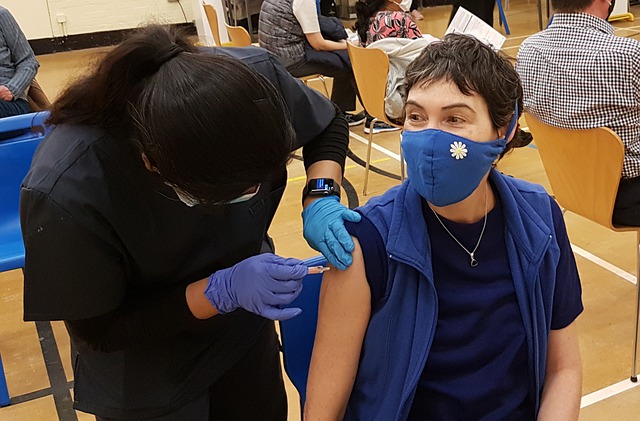Why Do Some People Experience More Severe Effects During COVID-19 Pandemic?
- Normal Liver Cells Found to Promote Cancer Metastasis to the Liver
- Nearly 80% Complete Remission: Breakthrough in ADC Anti-Tumor Treatment
- Vaccination Against Common Diseases May Prevent Dementia!
- New Alzheimer’s Disease (AD) Diagnosis and Staging Criteria
- Breakthrough in Alzheimer’s Disease: New Nasal Spray Halts Cognitive Decline by Targeting Toxic Protein
- Can the Tap Water at the Paris Olympics be Drunk Directly?
Why Do Some People Experience More Severe Effects During COVID-19 Pandemic?
- Should China be held legally responsible for the US’s $18 trillion COVID losses?
- CT Radiation Exposure Linked to Blood Cancer in Children and Adolescents
- FDA has mandated a top-level black box warning for all marketed CAR-T therapies
- Can people with high blood pressure eat peanuts?
- What is the difference between dopamine and dobutamine?
- How long can the patient live after heart stent surgery?
Why Do Some People Experience More Severe Effects During COVID-19 Pandemic?
During the COVID-19 pandemic, clinical outcomes for individuals infected with SARS-CoV-2 have varied significantly, ranging from asymptomatic cases to fatalities.
A research team from the Pasteur Institute, the French National Center for Scientific Research, and the French Academy collaborated with international scientists to investigate variations in immune responses to SARS-CoV-2 among populations from Central Africa, Western Europe, and East Asia.

Researchers have found that differences in immune responses to SARS-CoV-2 among these populations are influenced by human genetic factors shaped by cytomegalovirus latency infections and natural selection. These findings hold promise for enhancing patient management during future epidemics.
Their study suggests that cytomegalovirus latency infections and specific human genetic factors shaped by natural selection play a role in the varying immune responses and severity of COVID-19 among different populations. A deeper understanding of the factors driving these differences can strengthen patient care during future outbreaks. This research was recently published in the journal “Nature.”
Led by Lluis Quintana-Murci, the Human Evolutionary Genetics group at the Pasteur Institute investigates how humans differ in their immune responses to infections.
These differences may arise from distinct environmental exposures or population histories, including natural selection, resulting in genetic diversity patterns among human populations.
In this study published in “Nature,” scientists examined the extent and reasons behind variations in responses to the SARS-CoV-2 virus among individuals from different geographic and ethnic backgrounds.
During the COVID-19 pandemic, SARS-CoV-2 caused a spectrum of clinical manifestations, from asymptomatic infections to severe disease.
While advanced age remains a primary risk factor, factors such as male gender, comorbidities, and various human genetic and immunological factors also contribute to disease severity.
To investigate variations in immune responses to SARS-CoV-2 among different populations, scientists exposed immune blood cells from 222 healthy donors of Central African, Western European, and East Asian origins to the virus.
They utilized single-cell RNA sequencing to analyze the response of 22 types of blood cells to SARS-CoV-2.
Then, by integrating this data with serological and genetic information collected from the same individuals, they could assess the extent of differences in immune responses to SARS-CoV-2 among diverse populations and identify contributing factors.
Researchers identified approximately 900 genes associated with differing responses to SARS-CoV-2 among various populations.
Through genetic statistical analysis, they found that these differences were primarily due to variations in blood cell composition among different populations – the proportion of each cell type differed.
It is known that blood cell composition can be influenced by environmental factors, such as cytomegalovirus (a common herpesvirus in humans, typically harmless).
The prevalence of cytomegalovirus varies significantly among different populations, with serum positivity rates of 99% in Central Africans, 50% in East Asians, and 32% in Europeans.
The research team discovered that an individual’s environment, particularly latent cytomegalovirus infections, could influence immune cell responses to SARS-CoV-2.
Furthermore, scientists identified approximately 1200 human genes whose expression in response to SARS-CoV-2 is controlled by human genetic factors, and the frequencies of alleles regulating these genes vary among the studied populations.
Using population genetics methods, they detected repeated selection events for genes involved in antiviral functions.
“We know that infectious pathogens have had a strong impact on human survival and exerted significant selection pressure, shaping population genetic variation. Our research indicates that past natural selection has influenced contemporary human immune responses to SARS-CoV-2, especially in populations of East Asian ancestry, where the coronavirus exerted strong selection pressure about 25,000 years ago,” explained Maxime Rotival, a researcher at the Pasteur Institute’s Human Evolutionary Genetics group and the last co-author of the study.
Between 1.5% to 2% of the genomes of Europeans and Asians are derived from Neanderthals.
Increasing evidence suggests a link between Neanderthal ancestry and modern immune responses.
By comparing 1200 genes identified in the Neanderthal genome, scientists found dozens of ancient gene introductions that both alter antiviral mechanisms and resulted from ancient gene flow between Neanderthals and modern humans (Homo sapiens).
“Prior research has indicated that some of the genes we identified in our study are associated with the severity of COVID-19.
Our population-based comprehensive study highlights the direct impact of genetic variation in controlling immune responses to SARS-CoV-2 on the severity of COVID-19.
It also establishes connections between past evolutionary events, such as natural selection or Neanderthal admixture, and the current population’s immune responses and disease risk,” explained Lluis Quintana-Murci, Head of the Human Evolutionary Genetics group at the Pasteur Institute and a co-author of the study.
Darragh Duffy, Head of the Pasteur Institute’s Translational Immunology group, added, “By pinpointing precise cellular and molecular pathways influenced by genetic variations associated with COVID-19 severity, this research paves the way for precision medicine strategies that can identify high-risk individuals or facilitate the development of novel therapies.”
Why Do Some People Experience More Severe Effects During COVID-19 Pandemic?
(source:internet, reference only)
Disclaimer of medicaltrend.org
Important Note: The information provided is for informational purposes only and should not be considered as medical advice.



